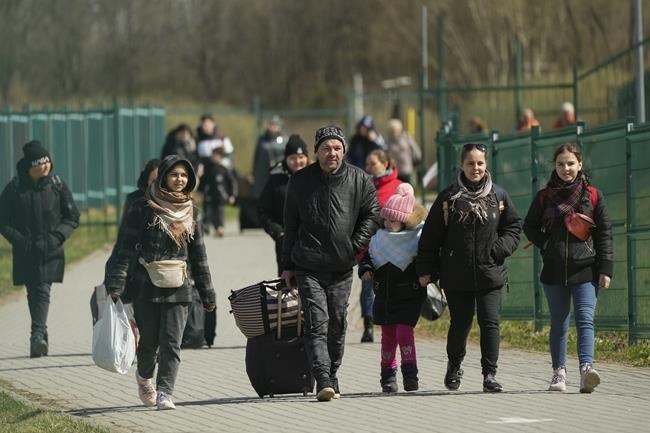OTTAWA — The federal government has announced $100 million in additional humanitarian support to respond to the worsening humanitarian crisis in Ukraine and neighbouring countries.
Prime Minister Justin Trudeau made the announcement Saturday during a social media fundraiser.
"Whether it's food, water, shelter, or medical aid -- we will continue to have your backs and provide the assistance you need at this time," Trudeau said in a statement. "We are standing up for Ukraine."
With Saturday's announcement, Canada has provided $245 million in humanitarian assistance to Ukraine. Of that, $145 million has been allocated to United Nations organizations, the Red Cross Movement, and to non-governmental organizations.
Immigration Minister Sean Fraser told reporters Saturday that Canada has already approved more than 30,000 applications under the Canada-Ukraine authorization for emergency travel program.
Repeating an announcement made in March, Fraser said Canada is exempting more Ukrainians fleeing Russia's invasion from providing biometrics before coming to Canada.
He said Canada won't require biometrics from people under the age of 18, over the age of 60, and those with previous Canadian visas that have no immigration issues.
Previously in those cases, it was left up to the "decision maker's discretion" whether to collect biometrics -- fingerprints and a photo.
Fraser said the government is making the move to "reduce the pressure on biometrics collection."
He said his department is also working to help facilitate travel for those who may not have travel documents.
"This means that for family members of Canadian citizens and permanent residents currently residing in Ukraine who don't hold valid travel documents IRCC can issues single journey travel documents on an exceptional basis to support their travel to Canada," Fraser said.
He said his department recently announced it is expanding settlement supports to provide access to key services to settle into new communities, such as language training, information about life in Canada, information on how to enroll children in school, and employment aid.
Transport Minister Omar Alghabra said his department is working with Canadian airlines to organize charter flights, but details haven't been finalized. Many of the affected Ukrainians are spread over a wide area and some aren't ready to leave just yet.
"No one should be forced to flee their homes and we are committed to helping Ukrainians who have had to leave their country because of this illegal war," Alghabra said.
"As Canadians we will do what we do best. We will stand up for Ukrainians and warmly welcome them as they adjust to new life here in their new country," he added.
As well, Ukrainians arriving in Canada will be eligible for two weeks of temporary hotel accommodation and up to six weeks of income support.
Fraser said the income support will be $500 per week. He said many of the people arriving have family or other connections in Canada, so it's unclear how many will need the temporary accommodations.
"This is all happening very quickly and further details are going to be available in the days and weeks ahead as these new measures begin to take effect," Fraser said. "I am, however, confident that the actions we are taking today demonstrate our ongoing and determined support for the people of Ukraine."
This report by The Canadian Press was first published April 9, 2022.
- By Kevin Bissett in Fredericton.
The Canadian Press
Note to readers: This story has been updated to reflect that the government previously announced biometric requirements had been lifted for some groups.




